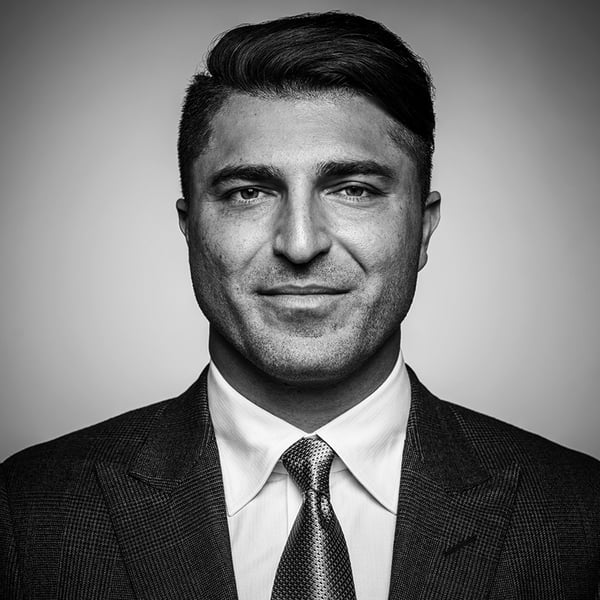https://cdn-res.keymedia.com/investmentnews/uploads/assets/graphics src="/wp-content/uploads2018/11/CI1180221121.JPG"
Going independent as a Registered Investment Advisor (RIA) is a decision requiring considerable thought and planning. In this second of a three-part series,
InvestmentNews Content Strategy Studio explores how one advisor — Reza Zamani, Senior Partner of Steel Peak Wealth Management in Woodland Hills, Calif. — decided to make the move, and how Schwab Advisor Services
TM not only helped with the transition, but also continues to support Steel Peak's growth.
InvestmentNews Content Strategy Studio: Tell us about your firm.
Reza Zamani: We're an independent Registered Investment Advisor located in the Los Angeles area, managing about $900 million in assets. Our team is me plus two partners, 13 advisors and eight staff. We've been in business since 2012 and we provide investment management as well as estate and insurance planning services.
INCSS: Tell us your personal story.
RZ: Like many RIAs, I have a wirehouse background. I'm 41, and when I was at the University of California at Santa Barbara, I played soccer on scholarship. A fan of the team who was a broker at a local wirehouse office offered me a non-paid internship, and although I was already working part-time to pay my expenses — scholarships only covered tuition so I took the internship to see if this was something I might want to do after college.
By the time I graduated, I knew I wanted to be an advisor. I went back to Los Angeles, where I grew up, got licensed through an independent broker-dealer and worked 15-hour days and weekends to get in front of prospects. I knew the first few years would be a lot of hard work with little immediate reward, but I remembered what my father always taught me: Delay gratification. Don't worry about rewards today; if you put in the work and stay disciplined, you'll get there.
INCSS: Tell us about how you attracted clients.
RZ: Since I was only 22 I thought older clients might not trust me with their investments, so I focused on insurance and long-term care. I held a lot of local seminars, and at one of them an advisor came by, liked what he heard, and asked me to join him at his wirehouse. I stayed there eight years and got into asset management. I also formed a business team with my two partners, Ali Zamani and Maziar Esmailbeigi. We built a large practice together, and in 2008 we received a sizeable bonus from another wirehouse and joined them. But something happened late in 2010 that led us to independence.
INCSS: What was the trigger?
RZ: Over the next year, we did our fact-finding and talked to Schwab, other custodians, possible vendors and several RIAs who had made the switch. We learned that we had huge misperceptions. We thought that as RIAs we wouldn't have access to alternative investments or be able to offer clients lines of credit or do financial planning. Nothing could be further from the truth. Independence actually gives you the freedom to do all that and more, including being totally transparent about fees. Everything we wanted to do for clients at a wirehouse but couldn't, we would be able to do as an independent RIA. So we decided to make the move. Since Schwab had been helping us all along, choosing them as our custodian was a no-brainer. The preparation process took about a year, and I can't speak enough about the power of Schwab in helping us launch the firm smoothly and methodically, facilitating our introduction to vendors and other RIA firms, and supporting us in every way.
INCSS: After making the independence decision, how did you feel?
RZ: There was actually a sense of regret that we hadn't considered independence earlier, when we switched wirehouses. We got a bonus, but there was no true benefit to our clients. Now, as a fiduciary, we truly do put our clients first. In going independent, we had to break a nine-year contract halfway into it, which meant writing a check for half our bonus money. But it made sense and I never regretted it. Taking that little step gave us happier clients, and put us in control of our own destiny.
INCSS: How is operating an independent RIA different from being part of a bigger company, and how has your business fared?
RZ: One of the biggest differences is the culture. As an independent firm, there's a kind of family feeling you have with other RIAs. Yes, we're competitors, but we support and help each other. In a wirehouse, you feel you are not only competing with the advisor down the street, but with the guy sitting right next to you.
As a business model, the independent RIA model is simply better. The high level of service we provide helps us retain and attract clients, and we're also growing by acquisition. We acquired a firm two years ago, and are looking at more opportunities. Schwab has provided great support, assisting us in making sure the cultural fit is right, and then helping us with the integration. From the very beginning, Schwab has encouraged us to think bigger about what we might create as a business — and helped us every step of the way.
To find out what going independent could mean for you, visit advisorservices.schwab.com/goindependent
Schwab does not supervise investment advisors and takes no responsibility to monitor the services they provide. Schwab Advisor Services™ includes the custody, trading, and support services of Charles Schwab & Co. (Member SIPC). (1118-8F1H)
This is a sponsored special feature developed by the InvestmentNews Content Strategy Studio and supported by Charles Schwab.







